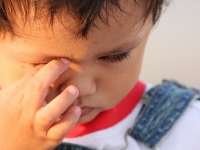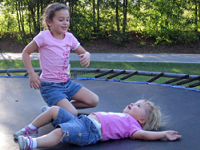Children
Gifts from God
The langauge children speak
Raising children
Messages to give to children
How children hear these messages
If children do not receive these messages
The advantage of therapy for a child
How therapy is done
Children who can benefit from therapy
Gifts from God
Children are precious gifts from God. Every child and parent is carefully put together in a family; a family perfect for the growth of every member.
 Children do not, unfortunately, always resemble the pure little angels they were in heaven
when they are on earth. Sometimes these little angels throw tantrums, cry a lot and say
unthinkable things!
Children do not, unfortunately, always resemble the pure little angels they were in heaven
when they are on earth. Sometimes these little angels throw tantrums, cry a lot and say
unthinkable things!The language children speak
Adults find it easier to speak their mind. Most of the time they are able to say what makes them sad or angry. For children this is more difficult. Young children, especially, feel their emotions, but they are only able to say they feel bad. As emotions are energy, it has to be released in some way. If children cannot release their emotions by saying what is wrong or even realizing what is not right, it is released through their behavior. Behavior is a child's language. With their behavior they "say" what is wrong and what they need. Even children who steal and do not want to accept authority are not bad human beings. Their behavior is just a symptom of what is really wrong.
Parents need to learn the language their children are speaking. It is important to learn that the behavior your child has is a way of telling you something is wrong. It is also important to find out what it is your child may be in need of. Whatever the need, a child will try to satisfy it through using something. If a child has, for example, a need for attention and to be "seen", he/she will find the attention in unacceptable ways if he/she does not get it in acceptable ways. This is a subconscious process and many times the child will be totally unaware of this. When asked, the child will most certainly not tell you that he is getting the attention he craves by throwing tantrums!
The roots of our unhealthy relationships and habits lie in our childhood. When these roots are recognized and treated early on in a child's life he/she has a very good change not to carry the unhealthy behavior to their adulthood, relationships and marriages.
Raising children
There is no perfect handbook handed to a parent when a child is conceived; no perfect book on how to make no mistakes as parents. Raising children comes with much happiness, but also with much responsibility; responsibility to guide this precious little human through life, but also responsibility to meet the needs of this unique human being. As we were all raised by not-so-perfect parents, we sometimes, not knowingly, repeat the not-so-perfect parenting we grew up with without even realizing it. As God created us as humans with free will and choice, the responsibility is on us to learn more every day about our children and their needs.
Messages to give to children
Children need to hear certain things from their parents. They not only need to hear this, they also need to experience it from the important caregivers in their lives. Some of these important messages they need to learn are:
- My parents love me unconditionally
- I am loved and accepted exactly the way I am
- I will never lose this love and caring
- I am good enough for my caregivers
- I am special
- I am worthy
- I am important
How children hear these messages
 Children hear our words and it is very important to tell your child all the things
mentioned above. Hearing the words "I love you" is very important to a child, but this
alone is not enough! The child has to concretely experience this love you are telling
him/her about. Saying "I love you" has no meaning to a child when the parent never takes
the time to listen to or spend time with him/her. The child will think "She says
she loves me, but she never takes time to sit with me and talk. What is this love worth?"
Saying "I love you exactly the way you are" but always criticizing the child about his
clothes, homework, room or friends are contradicting those words and make them meaningless.
Learning to give your children these messages by word and by deed is a big responsibility.
Children hear our words and it is very important to tell your child all the things
mentioned above. Hearing the words "I love you" is very important to a child, but this
alone is not enough! The child has to concretely experience this love you are telling
him/her about. Saying "I love you" has no meaning to a child when the parent never takes
the time to listen to or spend time with him/her. The child will think "She says
she loves me, but she never takes time to sit with me and talk. What is this love worth?"
Saying "I love you exactly the way you are" but always criticizing the child about his
clothes, homework, room or friends are contradicting those words and make them meaningless.
Learning to give your children these messages by word and by deed is a big responsibility.If children do not receive these messages
When children receive these emotional messages from their parents, they become emotionally very strong. They develop a strong sense of self and great self-esteem. All of this is needed in life for protection and success in work and relationships.
When a child does not receive the messages he/she needs in his life, he/she makes conclusions about him/herself; inaccurate conclusions like "I am a nuisance", "I am worthless", "I am in everyone's way", "I am not good enough", "I should never have been born". These decisions are stored in the subconscious mind of a child and carried with him/her to his/her last days unless changed. These decisions about us lay the foundation for all our relationships and behavior.
Without even realizing it, we choose partners and friends based on these decisions.
If a woman, for example, has made a subconscious decision early in her life that she is worthless, she will unknowingly choose people in her life that treats her like a worthless person. She may be abused in many ways and will accept this, trying hard to rid herself of the abuse, but repeating the pattern with a new partner. Unless she is helped in therapy to heal her own pain and change the subconscious decision she made, abuse will keep repeating itself in her life.
Children not getting the messages they need from their parents, do not feel good about themselves. When we do not feel good about ourselves, we need something outside ourselves to make us feel better. This is where the risk of addiction starts. Using drugs, alcohol, smoking, medicine, sex, internet, work or anything else to cope and feel better, has at its roots painful memories and not feeling like we should. Parents with knowledge of this can help their children from conception. Consciously giving your child these messages and affirming it through your behavior will help your child to become emotionally strong. Parents can help their children make these decisions about themselves so that they will consciously create good relationships when they are older.
The advantages of therapy for a child
Children do not always tell parents and teachers everything that has happened to them. Sometimes they are scared and afraid or say nothing because they think that this thing that happened happens to all children. All the anger or grief is stored in their little bodies and the decisions they make about themselves as a result of what happened, start to affect their daily lives.
Therapy is about healing these little wounds that nobody knows about; about changing the decisions wrongly made as a result of persons inflicting pain on a child; about releasing all the emotions that is stored in a child's body so that he/she does not have to carry it to adulthood; and it is about laying the foundations for healthy relationships and happiness later in life.
How therapy is done
 A therapist who works with children is trained in different kinds of techniques.
Therapy with children is not done like therapy with adults. Therapy with children involves
playing with sand, toys, clay, painting pictures, working with puppets, drawing pictures,
going on fantasy journeys and much more. To most children this process is a rather a
joyful one. Children usually feel much better after a session because the skilled
therapist will use all the abovementioned techniques to find out what is happening in the
child's life; to address all issues; to identify the wrong beliefs; and to find out what the
child's needs are.
A therapist who works with children is trained in different kinds of techniques.
Therapy with children is not done like therapy with adults. Therapy with children involves
playing with sand, toys, clay, painting pictures, working with puppets, drawing pictures,
going on fantasy journeys and much more. To most children this process is a rather a
joyful one. Children usually feel much better after a session because the skilled
therapist will use all the abovementioned techniques to find out what is happening in the
child's life; to address all issues; to identify the wrong beliefs; and to find out what the
child's needs are.Parents should not be worried if their child tells them "We only played" after a session. It only feels like playing to them, but much deeper emotional work has been done.
A lot of parents wonder about the right time to start therapy with their child. Earlier is usually better. Children loves to play and it is much easier to go and play at some friendly aunty's house than it will be later on in life when they need to talk about their painful memories in formal therapy.
Children who can benefit from therapy
All children can benefit from therapy. Not one child's life is without sadness, anger, loss or worries. In the following cases, however, therapy is recommended and will bring great gifts for your child for the rest of his/her life:
Children...
- who find it difficult to make friends
- with aggression
- with attention problems
- who wets the bed
- who experience divorce
- who suffered the loss of a loved one through death
- who bite their nails
- who are fearful
- who steal
- who cry a lot
- who are shy
- who do not want to go to school
- who had a traumatic experience
- with low self-esteem
- who do not want to accept authority
- who stutter

 © Copyright 2009-2017 Happy Family Therapy
© Copyright 2009-2017 Happy Family Therapy